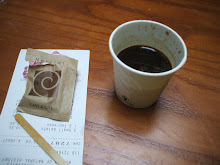I picked this up off Consumerist today. Apparently, big meat producers are fighting efforts by Creekstone Farms in Kansas to test all of its beef for mad cow disease. Or rather, the Bush administration has asked a Federal appeals court to prohibit Creekstone from testing its cows. The logic behind this is the same logic used in Monsanto's lawsuits against dairies in Maine, Pennsylvania, and elsewhere. The argument is rooted in the idea that saying their cows are free of mad cow (or that a farmer's milk is free of RBST or RGBH) implies that their "product" may not be as safe.
This kind of behavior is not without precedent in U.S. agribusiness. For instance, in the late 1890s and early 1900s, the USDA waged a trade war with several European countries over agricultural imports and exports. In one case, the U.S. trade representative went so far as to argue that our beef preserved with boric acid was healthier than German beef cured with salt. His logic? That every expert knew that the effects of salt were more dangerous.
In any case, at what point do we as a society—a political and commercial system—do we stop mortgaging our individual and societal good in favor of profit? At what point, do mass-producing corporations stop trying to shut down local producers and start trying to live up to their standards? Is it feasible to envision an agricultural system where the government protects the citizens rather than the corporations?
skip to main |
skip to sidebar

I'm back. Have a blast, y'all.

About Me
Blog Archive
- June (1)
- July (1)
- May (5)
- January (3)
- December (1)
- November (2)
- September (4)
- August (11)
- July (7)
- June (1)
- May (2)
- April (2)
- March (5)
- February (4)
- January (4)
- November (3)
- October (3)
- September (3)
- August (1)
- July (3)
- April (2)
- March (5)
- February (3)
- January (7)
- December (8)
- November (12)
- October (5)
- September (8)
- August (6)
- July (5)
- June (14)
- May (13)
- April (24)
- March (21)
- February (22)
- January (22)
- December (20)
- November (26)
- October (24)
- September (35)
- August (27)
- July (36)
- June (21)
- May (26)
- April (28)
- March (27)
- February (20)
- January (38)
- December (26)
- November (11)
- October (32)
- September (33)
- August (30)
- July (36)
- June (34)
- May (50)
- April (36)
- March (3)
- January (3)
- December (3)
- November (3)
- August (6)
- July (4)
What I Like
- A List Apart
- Accidental Creative
- AdLand
- AdRants
- Atrios
- Batocchio
- Byrd House Market
- Chowhound
- Creating Passionate Users
- daddytypes.com
- Daily Kos
- Design Observer
- design*sponge
- Epicuriousity (John Haddad)
- Flickr shots
- Gawker
- Getting Real - 37 Signals
- Gothamist
- Incertus
- Phil's bookmarks (web design and more)
- river city food and wine
- Smeltery fonts
- TreeHugger
- Veer
- Vitaly Friedman's fonts
- Wonkette
- Wornamental, Thornamental Design
- Xtcian
- zefrank
